 In light of the Julia-mania going on recently, the time seemed ripe to throw a Julia Child-inspired dinner party.
In light of the Julia-mania going on recently, the time seemed ripe to throw a Julia Child-inspired dinner party.Three cooks, three courses, and three recipes... with only one requirement: each recipe must come from one of Julia Child's own cookbooks. Period. No modifications, no substitutions, no straying from the gospel of Julia.
With Julia's prolific career as a cookbook author and chef, our choices for potential recipes seemed endless, from the much-publicized 524 recipes in her classic 1961 debut effort, Mastering the Art of French Cooking, to any number of recipes from her modern-day collaborations with other cooks, like Jacques Pepin.
We thought to ourselves: how hard could it be, right? Julia's reputation was built upon making French cooking accessible to American cooks. The woman was trying to teach American housewives to cook French food during an era when the closest thing to herbes-de-provence at the local Piggly Wiggly was curly parsley and mustard was just "yeller," certainly not deee-jon.
Yet, google Julia Childs' recipes, and all you will see is blog after blog about cooking disasters, burnt bourguignonne, and fallen souffles. Hmmm... sounds like a premise for a movie blockbuster, right? Perhaps, one starring Meryl Streep and Amy Adams...
Undaunted by the negative attitude swirling in the blogosphere, we designed our game plan for our dinner party. Our Julia Child menu included:

*Croque Madames, France's upgraded equivalent to the American grilled cheese sandwich. Only the French could make a slice of toast so decadent, draped with a tantalizingly thin slice of ham, and topped with a sauce of creamy bechamel. Although gruyere can easily be found in any gourmet cheese aisle nowadays, we followed Julia's instructions and grated some aged swiss into the sauce.
* To accompany the above, what could be better than a glass of Veuve Cliquot Ponsardin, a true champagne from Reims, France to whet our appetites for the rest of the meal! The entree:
The entree:
*Classic Beef Bourguignonne, chunks of beef simmered in red wine with bacon, pearl onions, and a handful of aromatic herbs. (Or, what AMB would call "Heaven!!!")
* Such richness is best served with a simple side dish. We recommend petite potatoes in colors reminiscent of flag of France (fingerling, blue, and red bliss);
*Don't forget copious amounts of French red wine and celebratory toasts to the chef!
Then, when you are about to faint from the brilliance of the Woman (or perhaps fall into a food coma)... you get to the finale, the dessert:

Once you see the dense slices of Reines de Saba (Julia's Queen of Sheba cake), you undoubtedly will MAKE room in your stomach. This rich almond and chocolate cake is served best, of course, avec un cafe au lait.
So, it was with visions of such dishes floating through our heads that we all departed to our separate kitchens to cook with plans to re-group for the dinner party. Oh, we learned! We at AMB would caution you: Julia and her recipes are not meant to be tackled alone. You are going to need a support group to address the questions and allay some of the doubts that inevitably come up along the way.
For instance, early on in the process, the first innocuous question arose about the Reine de Saba. Julia instructs you to "pulverize" the almonds. A very creative description, but it makes you wonder: exactly what does she mean by "pulverize?"


Humming "La Marseillaise," you brush the mushrooms in melted butter. Things are moving along swimmingly until you add the heavy cream to your mushroom mixture. Julia says to let it "thicken," but you realize that she fails to elaborate anything else. Is she thinking maybe five minutes enough or ten of "thickening?" How thick does this mushroom stuffing need to be exactly? Julia does not say....

Or, perhaps, you are the one who is two and a half hours deep and up to your elbows in simmering beef bourguignonne, when you are suddenly frozen by the realization that she never told you to add salt to the meat... AT ALL, EVER.
You bitterly recall how you spent a beautiful Saturday morning painstakingly peeling exactly 24 (and not one more!) miniscule pearl onions for the dish, just as Julia instructs. So, what exactly do you do now without her guidance on the matter? Season to taste? Do you dare to defy Julia and her recipe?
With the heat emanating from the stove, your grated thumb bleeding profusely, and the pulverized almonds sticking to the chocolate running down your leg... perhaps you begin to think, "Screw Julia! And her recipe!" and "Was the woman a masochist?!" She begins each recipe by telling you exactly what to do... And YOU DO! You hang on her every word, each participial phrase... like it is your lifeline. But then it happens, you're midway through the recipe or almost at the finish line - and she abandons you. There is nothing regarding how to pulverize almonds, how long to let cream thicken, or how to properly salt the beef.
Well, we at AMB would like to suggest that maybe THAT is part and parcel of Julia's gift to us. The woman was a chef and a mentor for aspiring cooks everywhere. She DOES want you to master the art of French cooking - but she realizes it is YOU in your kitchen, not her.
Ultimately, even with her as a guide... you are going to have to do some of the cooking yourself. You need to experience cooking food on your own (albeit, with a small support group) in order to develop some decent judgment about food.
If you talk to the surgeon general or any molecular gastronomist, cooking seems to be the new science. That said, in many important ways, cooking is still an art. So, look at it this way: Julia maybe is just giving you a little shove. She's telling you that you need to TASTE your food, add something of your own to it, give it a little love, and see if it just doesn't melt in your mouth in the end.... like butter. Even if you do stray from her recipes a bit for your Julia-inspired dinner party, we think Julia would still be proud.
Have fun and, of course, as she would say Boooohn Appateeeet!








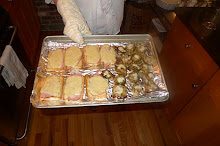



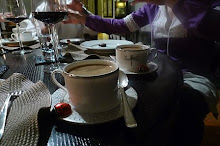

+001.jpg)
+009.jpg)
+010.jpg)
+039.jpg)
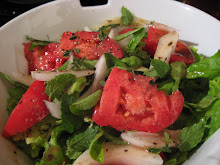+024.jpg)
+045.jpg)
+050.jpg)
+044.jpg)
+053.jpg)

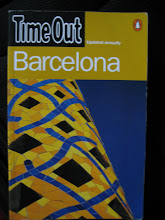


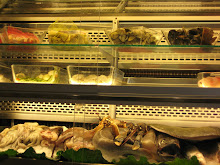






+022.jpg)
No comments:
Post a Comment